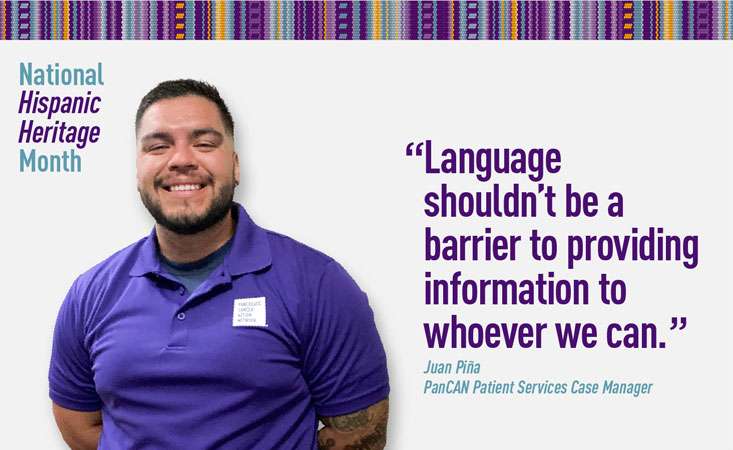
Born and raised in Southern California, Juan Piña helps patients and families navigate a diagnosis of pancreatic cancer through his work as a PanCAN Patient Services Case Manager.
Prior to joining PanCAN, he graduated from California State University, Long Beach and worked as a paralegal in an immigration office, where he learned the intricacies of case management and the importance of empathy. Today, As a Spanish-speaking member of the team, Juan draws from his own experiences growing up in his desire to serve this population.
“I am a first-generation kid whose parents immigrated to this country from Mexico, which has led me to empathize with and want to help the Spanish-speaking community,” he said. “I’ve always felt this sense that I want to help people. I always want to do what I can to be a better person.”
As part of our campaign celebrating Hispanic Heritage Month, we invite you to learn more about Juan and his work with PanCAN.
What is a day in the life like as a PanCAN Case Manager? What can patients and families expect when they give you a call?
As a PanCAN Patient Services Case Manager, we always meet patients where they’re at. Day to day is never the same. It’s always varied. If a person is recently diagnosed with the disease, we encourage them to reach out to PanCAN because we do provide a lot of information that’s helpful at the start. From then on, if they have a particular request, for example, say they want a list of pancreatic cancer specialists, then we can provide them with that information for anywhere in the U.S. We are happy to talk about clinical trials they find through our Clinical Trials Finder. Something that a lot of people aren’t aware of is our Know Your Tumor® service, where we’re able to cover the cost of biomarker and genetic testing through our partnership with Tempus.
With me in particular and a handful of our team, we also serve the Spanish-speaking community. We give them a little bit of extra support when it comes to having discussions with the doctor, because often either things get lost in translation or they’re not aware that they can ask questions during the conversation. I don’t want to speak for everyone, but with my culture specifically – my parents are Mexican – we’ve found that during a tough diagnosis, some people may shut down and not want additional support. With pancreatic cancer, this isn’t a situation you can confront alone. There’s a team. That support is really beneficial.
Why is it so important to have members of the Patient Services team who are fluent in Spanish?
Having Spanish speakers on the team is important because the world doesn’t necessarily speak English. There’s a variety of languages, a variety of cultures. For an organization that serves the nation, language shouldn’t be a barrier to providing information to whoever we can. Personally, in my own family, we’ve experienced a lack of resources. We weren’t necessarily the most wealthy. My mother was a single mom, so we made do with what we had. When I was young, my grandmother was diagnosed with lymphoma and I watched my family navigate her illness. Maybe we could have reached out for support, but we weren’t aware of those resources because she couldn’t speak English. Since PanCAN has dedicated people who can serve the Spanish-speaking population, and we have Spanish language information on our website, we’re able to provide that assistance for people faced with pancreatic cancer. Then when they hear about our resources, they can talk to their friends and the community. Word of mouth is important.
What is PanCAN to you?
PanCAN is hope. PanCAN is endearing. And honestly, PanCAN is a north star for some people. It’s a guiding light in the sense that if people reach out for their first experience and they’re leaving the shores of this diagnosis, then they’re able to reach out to us and we’re able to provide them with a sense of direction. If someone is stranded in the middle of the ocean with all these treatment options, with all this information, again, we’re able to redirect the conversation, have them focus in on questions that they can ask their doctor. PanCAN is a lot of things. For many people, at the end of the day, PanCAN is empathetic. We’re real people.
Contact PanCAN Patient Services for free information about the disease, treatment options and testing, as well as support resources and services.





